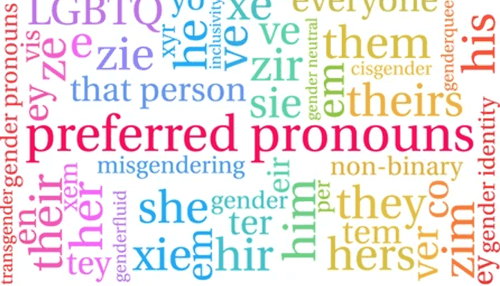In some ways, the landscape in America in 2021 is very different than it was just a few years ago. If you’re talking about sexuality and gender, that is definitely the case.
Over the past few years, society has paid more attention to the LGBTQ+ community. To our credit, we have tried to recognize these individuals more and secure protections for them. That is true in the workplace and elsewhere.
In particular, gender-nonconforming individuals are working to feel more comfortable in workplace settings. Some businesses are being very open-minded about these changes, while some are pushing back.
If you have a startup idea you’re about to get off the ground, you might wonder how to conduct yourself concerning transgender employees or gender-nonconforming ones. For instance, you might wonder about how you should address them. We’ll take a moment to talk about preferred pronouns in the workplace right now.
What is a Preferred Pronoun?
A pronoun is a word capable of functioning by itself in a noun phrase referring to a discourse participant. Examples would be “you” or “I.”
It could also mean someone or something you are mentioning elsewhere in your discourse. Examples are “this, he,” or “it.”
When we’re talking about preferred workplace pronouns, what we mean is how someone wants you to address them when you are not calling them by their name. Traditionally, you called someone either he or she depending on whether they were male or female.
In modern society, though, some individuals don’t identify with either traditional gender. Instead of he or she, they might prefer that you address them as “they.” There are also several other new pronouns that have become a part of the popular lexicon only recently.
What is Misgendering?
As someone who is running a startup, you doubtless want to hire the best candidates you can find for any open positions. You should not shy away from hiring transgender individuals or those who don’t conform to either traditional gender.
However, you need to do all you can to make such individuals feel comfortable in a workplace setting. Part of that is calling them by the pronoun they would prefer.
If you feel uncertain about what pronoun to use with someone, you can simply ask them. It’s not bad manners to see if they want you to address them in a particular way. They also might volunteer that information without you having to specifically ask them.
You want to avoid misgendering someone. Misgendering is the term we use if you call someone by a pronoun that they do not prefer.
Misgendering by Accident Happens Sometimes
All of this might seem a bit baffling to some people, and that’s okay. As we pointed out, gender and sexuality are coming to society’s forefront right now, and it’s not always the easiest thing in the world to adjust.
The reason why it’s essential that we try, either in the workplace or outside of it, is so we can attempt to include everyone in society and allow them to feel comfortable and accepted. As someone who runs a startup, you might be uniquely situated to give a transgender person or a gender-nonconforming individual a job when another company might not.
Since everyone is learning about these new pronouns and lifestyles together, you might accidentally call a worker by the wrong gender a couple of times. Maybe you will realize the mistake on your own, or possibly they might correct you.
That’s okay if you do it by accident. In time, you will probably register that person’s preferred pronouns, and it will no longer be an issue.
The thing you want to avoid is purposefully calling someone by the wrong pronoun when they have told you repeatedly they would prefer a different one. You also want to make clear to the rest of your employees that they shouldn’t do that.
Doing this is discrimination, and it can make someone feel very uncomfortable. Transgender and gender-nonconforming people have a much higher suicide rate, and they have much higher depression tendencies. Often, people purposefully not accepting or shunning them contributes to that.
It costs you nothing as a business owner to call someone by the pronoun they prefer and to welcome them and value their abilities. In time, all of this should seem much more typical than it is now. If society can start becoming more accepting of transgender and gender-nonconforming people, that would be the best possible thing



